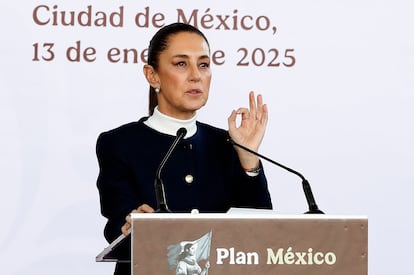‘Mexico has a plan’: Sheinbaum addresses uncertainty a week before Trump returns to the White House
The president says she has not been invited to the inauguration and sources consider it unlikely that she will travel to Washington, while doubts prevail over Mexico’s strategy to contain the Republican’s attacks

After a wait of more than two months, the moment of truth is approaching. Donald Trump will be sworn in as U.S. president on January 20, and the Mexican government is in the decisive stages of defining its strategy for what comes next. “I am convinced that the relationship between Mexico and the United States will be good and respectful, and that dialogue will prevail,” said Claudia Sheinbaum when delivering the report for her first 100 days in power, in an event marked by the concerns raised by the return of the Republican magnate to the White House. The president left her participation in Trump’s inauguration up in the air having stated last week that she had not received a personal invitation from the transition team. Barring a last-minute change, it is most likely that the Mexican representation will be delegated to its diplomatic corps in Washington, given that the participation of heads of state or government in this type of ceremony is not customary, according to sources consulted by EL PAÍS.
“They invited the entire diplomatic corps, it’s how it is done here,” confirmed Ambassador Esteban Moctezuma last weekend. Despite the custom of not inviting leaders from other countries, multiple U.S. media outlets have assured that the incoming president is seeking to turn the inauguration of his government into his first appearance on the international stage, and members of his team have confirmed that invitations were extended to leaders such as China’s Xi Jinping. There is also talk of the participation of ideological allies such as Argentine President Javier Milei, El Salvadoran leader Nayib Bukele, Italian Prime Minister Giorgia Meloni, or Santiago Abascal, leader of the Spanish far-right party Vox. This newspaper was able to confirm that the Mexican authorities are aware of the information that has come from the other side of the border, but also that it is unlikely that the traditional protocol for the inauguration will be broken, even if it is Trump, the least given to protocol among his predecessors in power.
“We will see,” Sheinbaum said last week, probably aware of the importance that Trump lends to these kinds of gestures. Jorge Schiavon, an academic at the Universidad Iberoamericana, believes that there is still time for a potential trip to Washington to function as a declaration of goodwill to get closer to the next administration. At the same time, it can also serve the Mexican authorities in giving support to their consular network and coordinating the coalition of allies in civil organizations, in the face of the threat of raids, mass deportations, and the criminalization of its migrants. “It is a critical moment for the Mexican government, due to the enormous weight that its relationship with the United States has,” says the specialist. The new Mexican president has already slightly deviated from the country’s diplomatic tradition by making an exception and calling the Republican to congratulate him on his victory in the November election, in order to keep the tone of diplomatic exchanges in the mildest possible terms.
Aside from matters of protocol, the Mexican government has announced that it will prioritize the defense of its compatriots in the United States, especially the over five million undocumented citizens; it has given hints of its plan for the renegotiation of the free trade agreement (T-MEC) and has sent signals of cooperation in the field of security, with the largest seizure of fentanyl in the country’s history. “In the face of any uncertainty that may come in the near future, Mexico has a plan and is united moving forward,” Sheinbaum insisted Monday when presenting her government’s investment plan. But doubts prevail among most specialists about the development of a comprehensive containment strategy in the face of Trump’s challenge. “We are not prepared,” says Schiavon. The academic argues that the specific reactions and diagnosis of the Sheinbaum administration have been accurate in the face of the provocations and tensions that have already emerged with the Republican, but he sees little substance beyond rhetoric. “Much ado about nothing,” the researcher summarizes.
The Mexican Foreign Ministry last week convened a meeting of ambassadors and consuls, a gathering that is held every year but which on this occasion took on greater importance given the political situation and the hopes placed on its consular network, the largest of any country in the world. Despite Trump’s threats, the Ministry suffered a cut of 700 million pesos ($33.9 million) in this year’s budget, reducing funds for assistance and protection services for Mexicans abroad.
There have also been questions about political appointments in Mexican diplomatic missions in the United States, such as that of Rutilio Escandón, former governor of Chiapas, in the Miami consulate. It has not been announced how long Moctezuma will remain as ambassador and who his successor will be, despite the fact that Trump nominated Ronald Johnson as his man in Mexico at the beginning of December. “There is a feeling that there will be twice as much work, without necessarily an increase in resources,” says Schiavon, who urges the Mexican government to align its discourse with its budgetary priorities. The researcher also fears the loss of human capital in other key portfolios such as the Economy Ministry, which is in charge of renegotiating the T-MEC and defining the measures in response to the tariff war that Trump has outlined to pressure Mexico. “I see an excess of confidence,” he warns.
“We will always hold our heads high,” Sheinbaum said Sunday, in front of tens of thousands of supporters in the Zócalo Square in Mexico City, before giving way to what has been her mantra during the difficult transition from Joe Biden to Trump: “We coordinate, we collaborate, but we never subordinate ourselves.” After the clashes, tensions, and rapprochements of the last few months, there is only one week of preliminaries left. The bilateral relationship will open a new chapter next Monday.
Sign up for our weekly newsletter to get more English-language news coverage from EL PAÍS USA Edition
Tu suscripción se está usando en otro dispositivo
¿Quieres añadir otro usuario a tu suscripción?
Si continúas leyendo en este dispositivo, no se podrá leer en el otro.
FlechaTu suscripción se está usando en otro dispositivo y solo puedes acceder a EL PAÍS desde un dispositivo a la vez.
Si quieres compartir tu cuenta, cambia tu suscripción a la modalidad Premium, así podrás añadir otro usuario. Cada uno accederá con su propia cuenta de email, lo que os permitirá personalizar vuestra experiencia en EL PAÍS.
¿Tienes una suscripción de empresa? Accede aquí para contratar más cuentas.
En el caso de no saber quién está usando tu cuenta, te recomendamos cambiar tu contraseña aquí.
Si decides continuar compartiendo tu cuenta, este mensaje se mostrará en tu dispositivo y en el de la otra persona que está usando tu cuenta de forma indefinida, afectando a tu experiencia de lectura. Puedes consultar aquí los términos y condiciones de la suscripción digital.









































